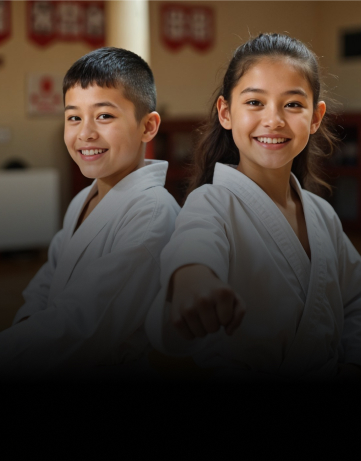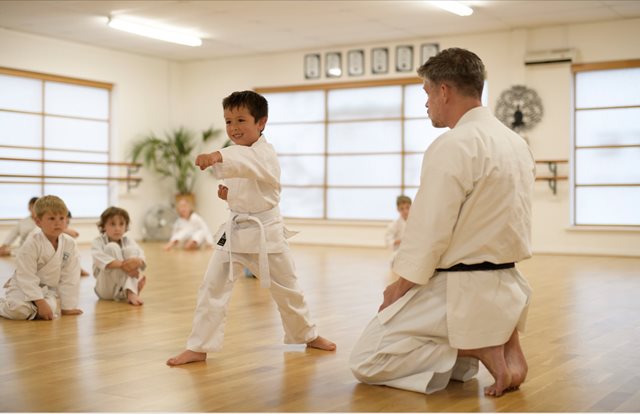Why Every Child Needs To Attempt Martial Arts for Kids: Letting Loose Prospective Through Martial Arts for Kids
Have you considered the effect martial arts could have on your youngster? This martial art offers more than simply physical skills; it grows confidence, self-control, and social connections. Each lesson is a step towards personal growth and strength that can last a life time. However what details benefits can your child experience through martial arts? Let's discover just how this method can nurture their potential in ways you could not expect.
The Physical Benefits of Karate for Children
When children method martial arts, they not only learn self-defense yet also gain countless physical benefits. Involving in karate aids improve stamina, flexibility, and coordination. As they kick, punch, and execute various stances, their muscles grow stronger and extra toned. You'll see their stamina increasing, making day-to-day tasks really feel easier and more enjoyable.Karate likewise advertises cardiovascular wellness. The vibrant motions elevate their heart prices, giving an exceptional exercise that sustains general physical fitness. Plus, exercising these techniques improves balance, which can be valuable in sports and various other physical activities.Moreover, the technique of martial arts encourages children to develop better stance and body awareness. They'll discover to manage their activities, which can decrease the threat of injuries both in martial arts and in every day life. All these physical advantages add to a much healthier and much more energetic way of life, establishing a strong structure for their future.
Structure Self-confidence and Self-confidence
Martial arts helps you face obstacles head-on, revealing you that you can get rid of barriers with practice and support. As you establish and achieve goals, you'll notice an increase in your self-confidence and self-worth. This journey not just develops your skills but also transforms how you see yourself.

Conquering Difficulties Together
As youngsters encounter various challenges in their karate journey, they learn to develop confidence and self-worth with perseverance and teamwork. Functioning with each other with peers, they tackle hard techniques and sparring sessions, urging each other to press beyond their restrictions. These moments cultivate a sense of sociability, revealing them that they aren't alone in their battles. When a child gets over an obstacle, whether it's grasping a brand-new move or taking part in an event, they acquire a sense of accomplishment that fuels their self-regard. Each tiny triumph enhances the idea that effort causes success. This supportive setting not only strengthens their martial arts abilities but additionally cultivates resilience, aiding them encounter life's difficulties with newfound self-confidence.
Setting and Achieving Objectives
Establishing and attaining goals in karate equips kids to construct self-confidence and self-esteem. When you set a goal, whether it's grasping a new technique or gaining a belt, you're producing a clear path to success. Each tiny accomplishment reinforces your belief in your abilities, revealing you that effort settles. As you educate, you'll face barriers, but overcoming these difficulties helps you grow stronger both literally and psychologically. Celebrating your development, despite just how little, keeps you motivated. This trip teaches you resilience and decision, abilities that extend past the dojo. By regularly setting and reaching goals, you'll cultivate a sense of achievement that increases your self-worth and motivates you to take on new obstacles, both in martial arts and life.
Developing Technique and Emphasis
While several activities can teach youngsters important abilities, fighting styles like karate uniquely foster technique and emphasis. With organized training sessions, you'll observe your child learning the value of regular and commitment. Each course requires them to listen thoroughly, comply with instructions, and practice continually, reinforcing their capability to focus on tasks.As they advance and gain new belts, your youngster experiences firsthand the rewards of difficult work and determination. This process cultivates a state of mind that values determination, showing them to press via challenges instead of providing up.In karate, focus isn't almost physical activities; it has to do with mental quality as well. Youngsters learn to clear distractions and direct their power efficiently, both in and out of the dojo. This newly found discipline and focus can convert right into other areas of their lives, boosting their scholastic performance and personal relationships. With martial arts, your youngster is set on a path toward lifelong development and success.
Enhancing Social Abilities and Teamwork
In martial arts, you'll not just learn martial arts however likewise develop relationships via technique. Interacting in classes encourages team involvement, assisting you link with your peers. These experiences cultivate team effort and boost your social skills, making karate a fantastic method to expand both literally and socially.
Structure Relationships Through Method
As youngsters practice martial arts with each other, they naturally create bonds that expand past the dojo. These shared experiences foster relationships, as they encourage team effort and mutual assistance during training sessions. When working together on techniques or sparring, youngsters find out to communicate properly and depend on each other. This friendship aids them create psychological links, making it less complicated to navigate social circumstances both inside and outside the dojo. As they cheer each other on during belt promos or competitors, their relationships strengthen, producing a feeling of belonging. Karate not only teaches self-control and focus however also cultivates a helpful setting where relationships grow. With practice, your child will certainly gain not simply fighting styles abilities, but valuable social abilities that last a life time.

Motivating Team Participation
Just how can team involvement in karate courses boost social skills and synergy? When your kid techniques karate with peers, they learn to interact effectively and work together toward typical goals. Competing, drills, and group workouts need collaboration and trust fund, promoting strong bonds amongst participants.As they deal with obstacles with each other, youngsters develop resilience and compassion, vital parts of teamwork. They'll additionally find out to celebrate each other's successes and support each other throughout obstacles, building a favorable atmosphere.Moreover, karate motivates respect and technique, crucial for communicating in team setups. By engaging in this martial art, your kid not only develops physical abilities yet also cultivates relationships, boosting their overall social proficiency and preparing them for future collaborations in various aspects of life.
Teaching Regard and Humility
While training youngsters karate, instilling regard and humbleness is equally as essential as mastering methods. In the dojo, you'll highlight the significance of acquiescing instructors and fellow students, producing an atmosphere of mutual respect. This method teaches kids to worth others, regardless of their ability level, and understand that everybody is on their own journey.Encouraging youngsters to acknowledge their mistakes cultivates humbleness, helping them learn that development originates from accepting obstacles. When they experience troubles, advise them that willpower and a positive perspective are essential.You'll also highlight the importance helpful others, whether it's using support to a having a hard time classmate or showing support here throughout technique. These lessons in regard and humbleness not just boost their martial arts trip but additionally shape them right into kinder, more compassionate people off the floor covering. By nurturing these values, you're assisting them expand into all-around, respectful members of culture.
Urging a Healthy Lifestyle
To foster a healthy lifestyle in youngsters, it is vital to integrate exercise, balanced nutrition, and psychological wellness into their daily regimens. Karate for kids provides an enjoyable way to boost their fitness. As they take part in classes, they'll enhance flexibility, toughness, and sychronisation while establishing discipline.Encouraging your youngster to exercise karate helps them understand the significance of routine exercise. Combining this with nourishing meals will support their development and energy levels. Show them to take pleasure in fruits, vegetables, and entire grains, creating a well balanced diet plan that fuels their activities.Additionally, martial arts instills a sense of regular, promoting consistency in their lives. As they commit to training, they'll discover to prioritize their health. By making karate a part of your child's life, you're not just supporting their physical capacities but likewise setting the foundation for a long-lasting commitment to a healthy way of life.
Promoting Psychological Strength and Anxiety Alleviation
Karate not just advertises physical conditioning but likewise plays a substantial duty in cultivating emotional strength and tension alleviation for kids. When you participate in karate, you learn to manage obstacles and challenges, assisting you develop a strong psychological perseverance. Each practice shows you to handle your feelings, whether it's disappointment from a hard technique or excitement from grasping a brand-new move.The organized atmosphere of karate courses supplies a risk-free space to reveal feelings and relieve anxiety. You'll discover that concentrating on techniques and competing can sidetrack you from day-to-day fears, enabling you to unwind. And also, the encouraging area urges friendship and friendship, which can bolster your psychological well-being.
Often Asked Inquiries
What Age Is Finest to Beginning Karate for Children?
The ideal age to start martial arts for youngsters is typically between 4 and six years of ages. At this age, they're extra responsive to learning, establishing control, and structure social abilities via engaging activities like martial arts.
The length of time Does It Take to See Improvements?
You'll typically see enhancements in your youngster's martial arts abilities within a few weeks - Best Martial Arts for Families. Regular practice, commitment, and positive reinforcement will increase their progress, helping them get confidence and effectiveness in martial arts faster than expected

Exist Any Type Of Dangers of Injury in Karate?
Yes, there are some risks of injury in martial arts, like in any type of sport. However, with proper training, guidance, and security equipment, you can considerably decrease these risks while taking pleasure in the psychological and physical advantages of karate.
What Equipment Do Children Requirement for Martial Arts?
For karate, youngsters generally need a gi, which is an uniform, and a belt to symbolize their rank (Best Martial Arts for Families). Depending upon the dojo, they could likewise need safety equipment like gloves, shin guards, and a mouthguard
Just How Usually Should Kids Method Karate Each Week?
Kids ought to practice karate at least 2 to 3 times a week. Constant technique assists develop abilities, build confidence, and improves fitness. You'll see renovation and development in their capabilities with regular training sessions. When youngsters technique karate, they not just find out self-defense however also gain countless physical benefits. Plus, exercising these methods enhances equilibrium, which can be helpful in sporting activities and various other physical activities.Moreover, the technique of karate urges kids to develop far better stance and body awareness. While numerous tasks can educate youngsters beneficial skills, martial arts like karate distinctly foster technique and emphasis. Martial arts not only promotes physical fitness however also plays a significant role in fostering psychological strength and stress and anxiety alleviation for youngsters. Kids ought to exercise martial arts at the very least 2 to three times a week.